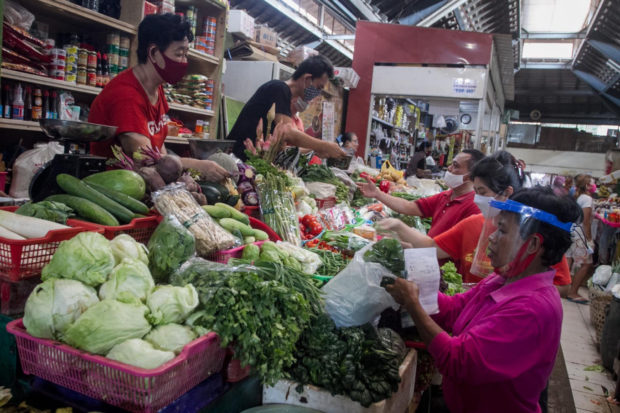Indonesia’s inflation hits record 20-year low in August amid declining purchasing power

Shoppers and traders wear face coverings on June 17, 2020 at Pasar Gede in Solo, Central Java. Indonesia’s August 2020 inflation was the lowest in two decades as consumer prices fell due to weak purchasing power, Statistics Indonesia (BPS) announced on Sept. 1. Antara/Mohammad Ayudha via The Jakarta Post/Asia News Network
JAKARTA — Indonesia recorded the lowest inflation in two decades in August as consumer prices fell due to weakening purchasing power, Statistics Indonesia (BPS) announced on Tuesday. BPS said Indonesia’s consumer price index (CPI) declined to 1.32 percent in August. The CPI fell further below Bank Indonesia’s 2020 inflation target of 2 to 4 percent to reach the lowest level since May 2000, as the global health crisis continued to batter the country’s economy and consumer spending. “Inflation in many countries slowed [and] even headed into deflation, as the COVID-19 pandemic delivered a severe blow to [both] the demand and supply sides,” BPS head Suhariyanto told a virtual press briefing on Sept. 1. “The declining trend in core inflation showed that purchasing power has yet to recover.”
Indonesia recorded core inflation of 2.03 percent in August, while administered prices were up 1.03 percent. At the same time, food prices recorded an annual deflation of 1.09 percent. The pandemic has hit Indonesian consumers hard, with millions losing their jobs due to a cooling economy as a result of the COVID-19 physical restrictions. Household consumption, which typically accounts for more than half of Indonesia’s gross domestic product (GDP), shrank 5.51 percent, deeper than overall economic contraction of 5.32 percent in the second quarter of the year. The CPI recorded a 0.05 percent month-to-month (mtm) deflation in August, due primarily to the falling prices of poultry, shallots and air travel. In comparison, the CPI saw 0.12 percent mtm inflation in August 2019. The steepest deflation in August was recorded in food, beverage and tobacco prices (0.86 percent) as well as transportation prices (0.14 percent). Meanwhile, the highest inflation was recorded in personal care and other services (2.02 percent), including gold, and in education (0.57 percent).
The personal care and education segments resisted deflation due to an increase in gold prices, while the new academic year led to seasonal inflation due to increased tuition for primary, secondary and tertiary education, said Suhariyanto. The increasing trend in gold prices indicated a higher risk of a recession in the third quarter, said Bank Mandiri chief economist Andry Asmoro. He added that easing core inflation indicated “significantly weaker demand” that had “still not recovered”. The major contributor to annual inflation this year would be “the increasing gold prices due to uncertainty in the global financial markets”, Andry wrote in a research note made available to The Jakarta Post. He also expected inflation to reach 1.95 percent by the yearend, lower than the 2.59 percent inflation recorded last year as well as the central bank’s target range. “We view that the increased money supply from the economic stimulus, namely [the] quantitative easing and burden sharing [policies], will have a limited impact on the inflation rate this year. This condition will support the central bank in continuing to accommodate the monetary policy,” he said. Bank Indonesia (BI) has cut the benchmark interest rate four times this year to 4 percent, the lowest since 2016, to cushion the economy from the impacts of the pandemic. The central bank is also continuing in its role as a standby buyer of government bonds and is taking part in a debt monetization scheme to help the government fund its COVID-19 response. The fiscal authority has earmarked Rp 695.2 trillion (US$47.2 billion) in stimulus measures to revive the economy and stimulate domestic demand, even as consumers reined in spending while the government restarted economic activities in August to accelerate recovery. Finance Minister Sri Mulyani Indrawati said recently that the economy was projected to shrink another 2 percent in the worst-case third-quarter scenario for an estimated annual contraction of 1.1 percent.
For more news about the novel coronavirus click here.
What you need to know about Coronavirus.
For more information on COVID-19, call the DOH Hotline: (02) 86517800 local 1149/1150.
The Inquirer Foundation supports our healthcare frontliners and is still accepting cash donations to be deposited at Banco de Oro (BDO) current account #007960018860 or donate through PayMaya using this link.